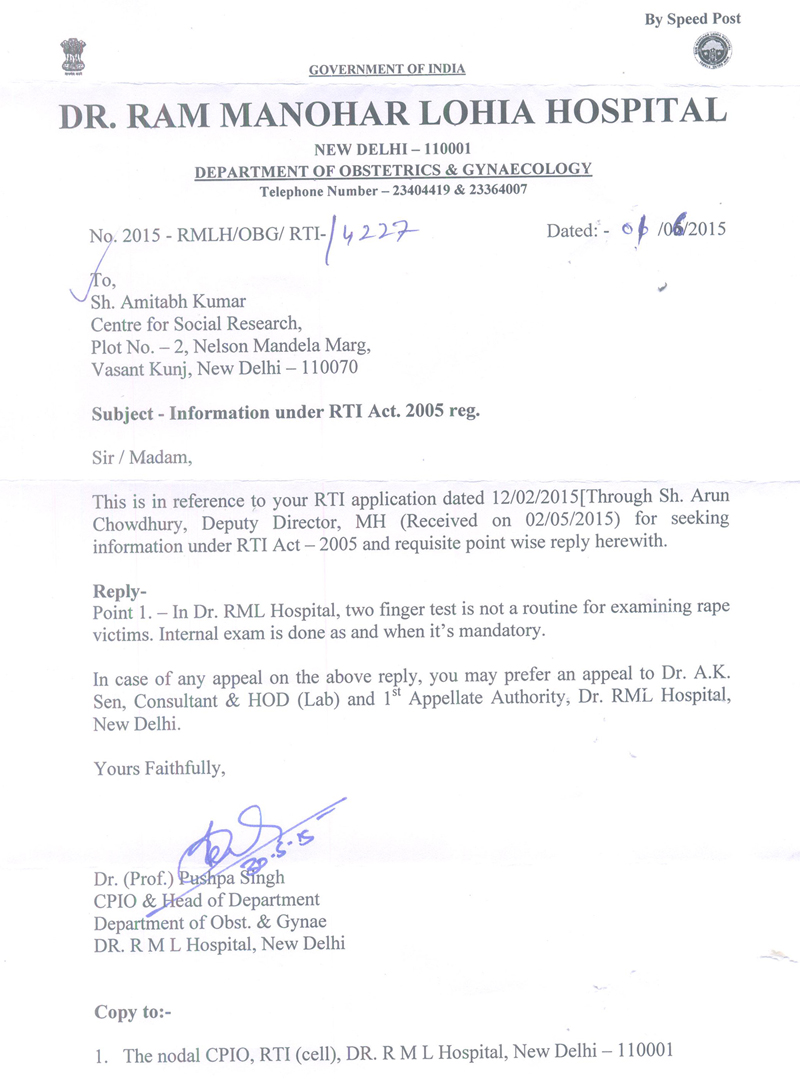In May 2013, the Supreme Court had already argued that the controversial Per Vaginal (PV) examination, better known as the two-finger test, was “inhuman” and harmful to the “physical and mental integrity and dignity” of rape survivors. This ruling was given in response to a campaign initiated by 90 civil society organisations, who wrote to the then Prime Minister, Manmohan Singh, advocating reforms in responses to gender-based violence. Regardless of this issued statement, no steps were taken by the Delhi Government to eliminate the usage of the two-finger test.


Many NGOs who are working with the rape survivors have continued the struggle to eliminate the usage of this test. On 12th of February CSR had filed an RTI to inquire about vaginal examination practices in hospitals across Delhi. We received a reply from the CPIO & Head of Department (Dr. Ram Manohar Lohia Hospital) stating that “In Dr. RML Hospital, two finger test is not a routine for examining rape victims. The internal exam is done as and when it’s mandatory” [emphasis added]. This response is in line with the advisory which the Delhi Government on 31 May 2015 started circulating stating that “it cannot be recommended that physicians be made to function under the constraint of a complete ban of these essential steps of internal examination of a sexual assault survivor”.
Precisely one week later, the government was forced to clarify the advisory under pressure of civil society. And it read: “it is now clarified and further reiterated that medical professionals should not perform the “two finger test” for ascertaining the habituation of the sexual assault victim/survivor to sexual intercourse.


This clarification is an important step forward for a couple of reasons. Firstly, because the test simply cannot deliver the proof it promises, namely information on one’s sexual history. Basically, it is done to examine the hymen and the laxity of the vagina by inserting one or two fingers into it.If the insertion of the fingers is difficult, this is interpreted as meaning that the victim was a virgin, whereas easy insertion of two fingers suggests that she is “habituated to sexual intercourse.” In reality this methodology amounts to a little scientific value. It is important to realize that the status of a hymen is in no way a conclusive indicator of whether a person has been sexually active or whether she has been sexually assaulted. In case of some women the hymen can be damaged or stretched for example by the usage of tampons, a gynaecological exam, disease or physical exercise such as horse riding, gymnastics, dancing etc.
The belief in the usefulness of the outcomes of this test is problematic especially when these results are used as courtroom evidence. In the case of rape charges, police officers and judges still ask for evidence of hymnal injuries, dismissing cases in which such evidence are not provided with. This is especially harmful to victims of rape whose hymen tissue do not show any sign of injuries. Degradingly a “habituated” woman can become portrayed as “weak of character” and therefore unable to refuse sex. As a result, in many cases justice have been denied as the reports fail to prove that the sex was forced or non-consensual.
Additionally, we might also argue that it is a highly insensitive method as it mimics the original penetrative assault, causing additional trauma. Medical specialist and social workers have coined the term “re-rape” to refer to the act. The humiliation aspect of the test does not only derive from the painful procedure performed on the survivor, but also from making it the victim’s responsibility to prove the assault. In a context where women are often highly stigmatized for being raped, this adds anxiety to the already stressed survivors.
Essentially, the two finger test should be seen as another way of policing women’s bodies and sexualities.Unbiased sexual education is highly needed to burst some of the myths surrounding female sexuality in the minds of those from whom the victims seek help.
Looking forward to reading your blogs, you can mail us your entries at WriteWithUs@csrindia.org, or upload them at Write With Us.
Donation for Centre for Social Research to Join our effort in rehabilitating Domestic Violence
Discuss this article on Facebook





